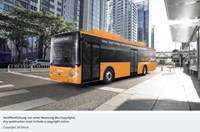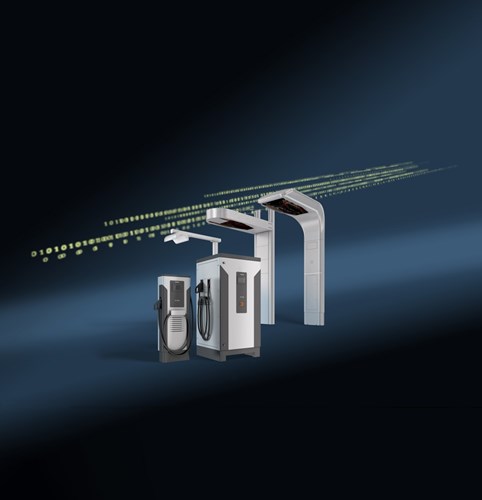
New Zealand already boasts more than 80 percent renewable electricity generation. To further drive decarbonization, one major lever is the electrification of the transport sector, representing 36 percent of energy use in New Zealand. The city of Auckland, for example, aims to have a full zero emission bus fleet by 2040. “As a national bus operator, Go Bus needs to be agile and adapt to many fast-moving changes when transitioning to electric bus transport,” said Calum Haslop, CEO of Go Bus. “It’s also important that any investments we make now, take into account rapid advances in battery technology and digitalization. Siemens’ independent charging infrastructure and management software provides us with the most future-proof solutions and flexibility.”
The Siemens Sicharge UC range grants bus operators optimal flexibility when planning electric bus depots, by providing highly efficient infrastructure that is designed to be future proofed against rapid advances in battery technology. It also enables bus operators to economically expand charging infrastructure with up to five dispensers plus a pantograph per charging centre.
 Jeff Connolly, CEO of Siemens Australia Pacific and head of Siemens’ Smart Infrastructure portfolio in the region said, “We’re proud to see our technology play a pivotal part in fulfilling New Zealand’s low carbon future. It’s critical to have a long-term view of transport infrastructure – one that centers around the effective and efficient use of the right technology and seamless movement of people.”
Jeff Connolly, CEO of Siemens Australia Pacific and head of Siemens’ Smart Infrastructure portfolio in the region said, “We’re proud to see our technology play a pivotal part in fulfilling New Zealand’s low carbon future. It’s critical to have a long-term view of transport infrastructure – one that centers around the effective and efficient use of the right technology and seamless movement of people.” The charging system in the Christchurch depot will consist of 12 Sicharge UC 200 Charging Centers with dispensers powering 25 parking spaces with up to 200 kilowatts (kW). In Auckland, there will be five of these systems as well as two Sicharge UC 100 stations with a charging power of up to 125 kW, supplying a total of nine eBuses. Both solutions provide plug-in depot charging, according to CCS standard, overnight or for top-up charging between scheduled bus services during the day. The Sicharge UC family supports battery voltages from 10 Volt (V) up to 1,000 V. Current eBuses available in the New Zealand market average between 600 to 700 V, but future bus batteries are expected to use higher voltages to enable faster charging. Additionally, the charging system uses open communication standards as Open Charge Point Protocol (OCPP) to interact with different backend software, for example for charging management.
The reporting and monitoring function of Siemens’ charging management software will enable Go Bus to centrally monitor all charging infrastructure across two cities and easily report on key metrics including electricity savings. Smart management functionality will also enable Go Bus to schedule charging to take advantage to lower overnight tariffs while ensuring that individual buses have reached the desired state of charge by the time they are needed for the next day’s operations.
About Siemens
.png) Siemens AG (Berlin and Munich) is a global technology powerhouse that has stood for engineering excellence, innovation, quality, reliability and internationality for more than 170 years. The company is active around the globe, focusing on the areas of intelligent infrastructure for buildings and distributed energy systems, and automation and digitalization in the process and manufacturing industries. Through the separately managed companies Siemens Energy, the global energy business of Siemens, and Siemens Mobility, a leading supplier of smart mobility solutions for rail and road transport, Siemens is shaping the energy systems of today and tomorrow as well as the world market for passenger and freight services. Due to its majority stakes in the publicly listed companies Siemens Healthineers AG and Siemens Gamesa Renewable Energy (as part of Siemens Energy), Siemens is also a world-leading supplier of medical technology and digital healthcare services as well as environmentally friendly solutions for onshore and offshore wind power generation. In fiscal 2019, which ended on September 30, 2019, Siemens generated revenue of €86.8 billion and net income of €5.6 billion. At the end of September 2019, the company had around 385,000 employees worldwide.
Siemens AG (Berlin and Munich) is a global technology powerhouse that has stood for engineering excellence, innovation, quality, reliability and internationality for more than 170 years. The company is active around the globe, focusing on the areas of intelligent infrastructure for buildings and distributed energy systems, and automation and digitalization in the process and manufacturing industries. Through the separately managed companies Siemens Energy, the global energy business of Siemens, and Siemens Mobility, a leading supplier of smart mobility solutions for rail and road transport, Siemens is shaping the energy systems of today and tomorrow as well as the world market for passenger and freight services. Due to its majority stakes in the publicly listed companies Siemens Healthineers AG and Siemens Gamesa Renewable Energy (as part of Siemens Energy), Siemens is also a world-leading supplier of medical technology and digital healthcare services as well as environmentally friendly solutions for onshore and offshore wind power generation. In fiscal 2019, which ended on September 30, 2019, Siemens generated revenue of €86.8 billion and net income of €5.6 billion. At the end of September 2019, the company had around 385,000 employees worldwide. 



Comments
There are no comments yet for this item
Join the discussion